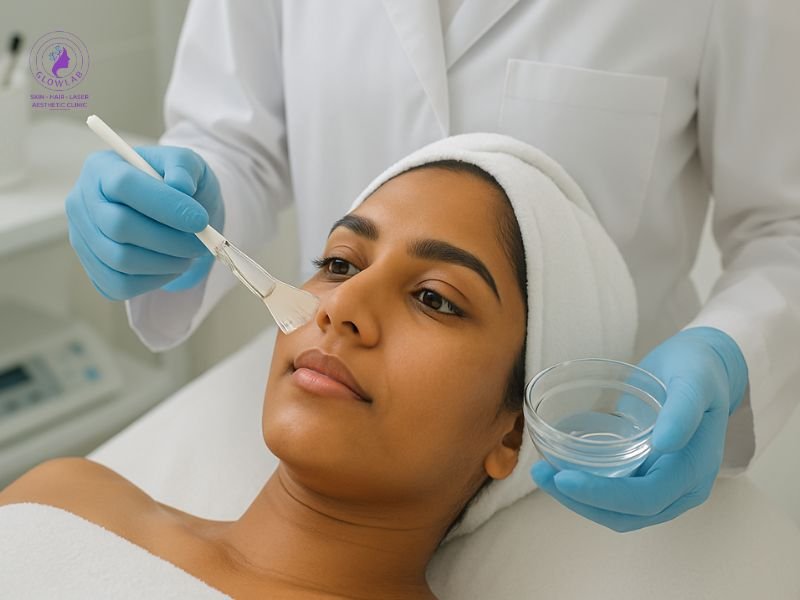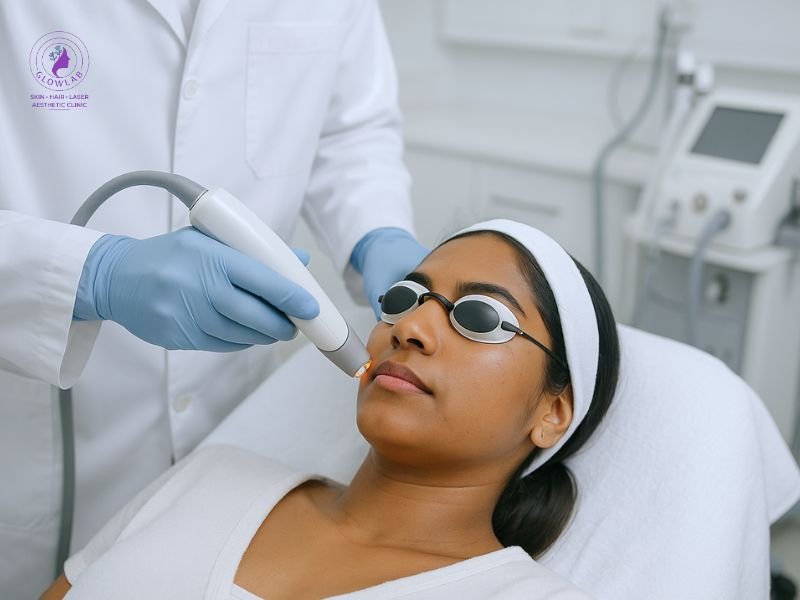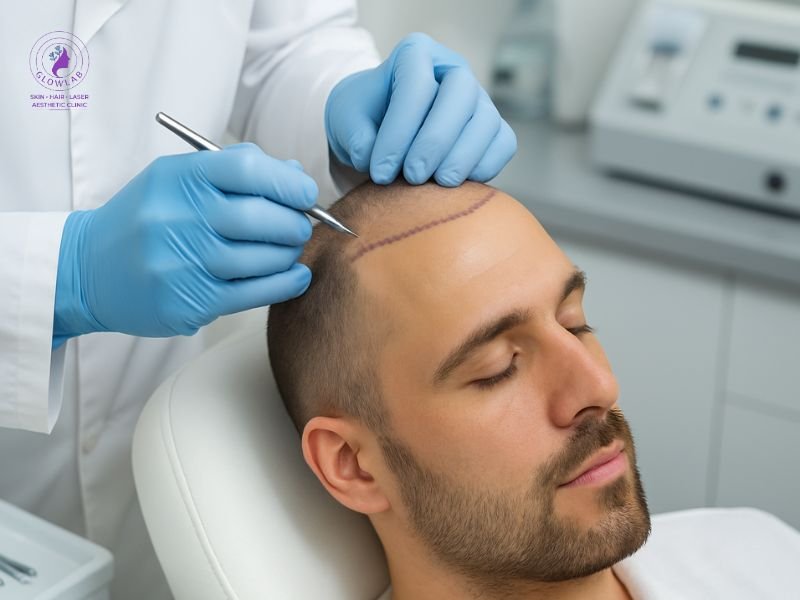benefits of chemical peel treatment
Dull skin, stubborn acne scars or uneven patches are common. Have you tried several remedies that don’t work at all? If your skin has been tanned, damaged by the sun or has pigmentation, a chemical peel may come to your rescue. In such a case, you can find multiple benefits of chemical peel treatment. However, not everyone might be ideal for it.
What Is A Chemical Peel Treatment?
A chemical peel is a cosmetic procedure designed to enhance the skin’s appearance. Here, a carefully formulated chemical solution is applied to the face or the targeted area. The uppermost layer gradually sheds, and as the treated area heals, a smoother layer of new skin emerges. There are different types of chemical peel treatment, where the thickness of the layer or the combination of this treatment with other aesthetic procedures may vary.
1) Enzymatic Peel
An Enzymatic Peel works gently on the skin and helps brighten it. It uses natural enzymes to remove the outermost layer and provides a smoother texture and a more radiant, refreshed look. Besides being suitable even for sensitive skin types, there are various benefits of chemical peel treatment using the Enzymatic Peel.
More benefits include unclogging and shrinking pores, removal of dry and flaky skin, diminishing fine lines, wrinkles and scars and fading age spots, sun damage and redness.
2) Pigment Peel
This chemical peel for pigmentation is a 2-step intensive topical treatment system designed to reduce and regulate stubborn and dense pigmentation and irregular spots. It contains ingredients that work quickly and provide effective reduction of undesirable pigment.
3) Sensitive Skin Peel
This type of peel contains 95% ingredients of natural origin. It peels off dead epidermal cells and facilitates the penetration of active ingredients. Also, it slightly brightens, smooths and softens the skin and prepares it for further cosmetic treatments.
4) Party Peel
A party peel is a quick, skin-brightening treatment that provides you with a radiant glow just in time for a special occasion such as a wedding or a party. It is generally done one or a few days before the event.
5) Underarm Peel
Skin Brightening gel peeling is an effective chemical peel for pigmentation of the underarms. It helps in underarm skin lightening, hydration, whitening and smoothing.
6) Lip Lightening Peel
Our lip peel exfoliant treatment for dark and dull lips helps lighten, brighten and plump your lips. Lip lightening peel is derived from natural fruit exfoliant and fermented milk. It also helps the lips look pinker. Thus, it is beneficial for those looking for a chemical peel for pigmentation of their lips.
7) Full Body Skin Brightening Chemical Peel Treatment
Full body chemical peel is one of the types of chemical peel treatment that work on breaking down the melanin pigment. Besides reducing the visibility of the large burn spots on the body, it helps with other skin-related issues.
8) Neck Brightening Peel
Beneficial for those looking for a chemical peel for pigmentation, this treatment includes applying a suitable peel to the target area of the neck. Different types of chemical peel treatment will be used here according to your skin condition to achieve the desired depth and intensity of skin renewal.
Top 7 Benefits Of Chemical Peel Treatment
Based on the areas it is applied to, such as the neck, hands or face, the following are the top 7 benefits of chemical peel treatment:
- Reduction in the specific types of acne
- Reduction in fine lines around your mouth
- Minimisation of freckles, age spots and sun spots
- Addressing the dark patches due to birth control pills or pregnancy
- Wrinkles and fine lines caused by certain hereditary factors can also be addressed
- Provision of an even skin tone
- Can work on deeper scars or wrinkles
Ideal Candidates For Different Types Of Chemical Peel Treatment
Not everyone can be ideal for chemical peels. Thus, you are ideal if:
- You can avoid excessive sun exposure during the recovery phase
- You did not have an abnormal skin scarring history
- You do not have any sensitive skin conditions
- You are not on any medications that can affect the results of the peel
- You are not pregnant
- You do not have severe cold sore outbreaks
Before And After The Treatment
Though there are several benefits of chemical peel treatment, certain steps have to be followed to avoid complications.
Before The Treatment
- A thorough skin condition assessment
- Antiviral medicines
- Staying out of the sun for a specific period
- Pausing certain treatments for a specific period
- Arrangement of logistics to and from the clinic
After The Treatment
- Potential skin redness, swelling, tightness and irritation
- Application of ointments recommended by the doctor
- Consumption of medications for pain, as suggested by the doctor
- Avoidance of going into the sun for a specified period
- Attending post-peel check-ins
Best Cosmetologist In Vasai
It is natural for people to wish to enhance their appearance. There are various benefits of chemical peel treatment, but they can be seen only when the treatment is performed by an experienced doctor or the best cosmetologist in Vasai.
Glowlab is an ideal choice as the best clinic for chemical peel, as well as for those looking for the best cosmetologist in Vasai. It is led by a doctor with immense hands-on experience in the field, years of dedication and knowledge of handling high-tech equipment. Here, individual skin conditions are taken into consideration and treatments are offered accordingly. All types of chemical peel treatment mentioned above are provided here.
The team ensures accessibility for the clients and provides proper pre- and post-treatment care. Due to their client-centric approach, hygiene and sanitisation are always considered a priority here. Overall, these benefits make Glowlab a leading choice for those looking for the best skin clinic or the best cosmetologist in Vasai.
Interested In Getting A Chemical Peel Treatment?
Final Thoughts
There are multiple types and benefits of chemical peel treatment, but careful consideration is required before opting for one. Thus, selecting the best cosmetologist in Vasai is important to get a treatment that suits your skin conditions. Similarly, the team should be accessible to provide you with aftercare support. In this case, Glowlab, with all its benefits, stands as the best choice for chemical peel treatment in Vasai.
So, take a first step towards your enhanced appearance with Glowlab today!






